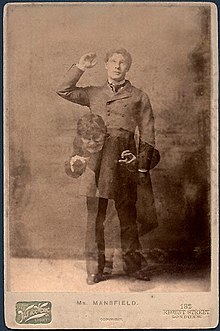Dr. Jekyll
| Dr. Henry Jekyll | |
|---|---|
| Strange Case of Dr Jekyll and Mr Hyde character | |

Richard Mansfield played Jekyll and Hyde in a stage adaptation of the novella
|
|
| Created by | Robert Louis Stevenson |
| Information | |
| Nickname(s) | Edward Hyde (or Mr. Hyde or Hyde) |
| Gender | Male |
| Nationality | English |
Dr. Henry Jekyll and his alternative personality, Mr. Edward Hyde, is a fictional character in Robert Louis Stevenson's 1886 novella Strange Case of Dr Jekyll and Mr Hyde.
Dr. Henry Jekyll is a "large, well-made, smooth-faced man of fifty with something of a slyish cast", who occasionally feels he is battling between the good and evil within himself, thus leading to the struggle between his dual personalities of Jekyll and Edward Hyde. He has spent a great part of his life trying to repress evil urges that were not fitting for a man of his stature. He creates a serum, or potion, in an attempt to mask this hidden evil within his personality. However, in doing so, Jekyll transforms into Mr. Hyde, a hideous, evil creature without compassion or remorse. Jekyll has many friends and has a friendly personality, but as Hyde, he becomes mysterious and violent. As time goes by, Hyde grows in power. After taking the potion repetitively, he no longer relies upon it to unleash his inner demon i.e., his alter ego. Eventually, Hyde grows to be stronger than Jekyll.
Stevenson never says exactly what Hyde takes pleasure in on his nightly forays, generally saying that it is something of an evil and lustful nature. Thus, in the context of the times, it is abhorrent to Victorian religious morality. Hyde may have been reveling in activities that were not appropriate to a man of Jekyll's stature, such as engaging with prostitutes or burglary. However, it is Hyde's violent activities that seem to give him the most thrills, driving him to attack and murder Sir Danvers Carew without apparent reason, making him a hunted outlaw throughout England.
A lawyer named Gabriel Utterson and Dr. Jekyll's butler Mr. Poole end up breaking into Dr. Jekyll's lab. Inside, they find the body of Hyde wearing Jekyll's clothes and apparently dead from suicide. They find also a letter from Jekyll to Utterson promising to explain the entire mystery. Utterson takes the document home where he first reads Lanyon’s letter and then Jekyll's. The first reveals that Lanyon’s deterioration and eventual death resulted from the shock of seeing Mr. Hyde drinking a serum or potion and as a result of doing so, turning into Dr. Jekyll. The second letter explains that Jekyll, having previously indulged unstated vices (and with it the fear that discovery would lead to his losing his social position) found a way to transform himself and thereby indulge his vices without fear of detection. But Dr. Jekyll's transformed personality Mr. Hyde was effectively a sociopath — evil, self-indulgent, and utterly uncaring to anyone but himself. Initially, Jekyll was able to control the transformations, but eventually he would become Hyde involuntarily in his sleep.
...
Wikipedia
